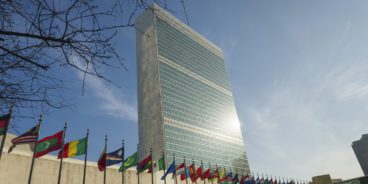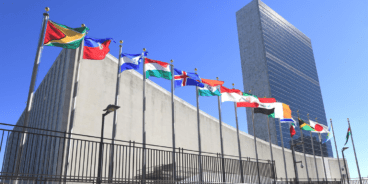
Statement for the 70th Anniversary of the United Nations
Seventy years ago, in the shadow of atrocities perpetrated during World War II, the United Nations was founded with the primary goal of saving “succeeding generations from the scourge of war.” Since then, from the adoption of the Universal Declaration of Human Rights to the development and deployment of peacekeeping operations, the UN has been at the forefront of protecting the most vulnerable populations around the globe.
Despite these commitments, all too often the UN has failed to act in a timely and decisive manner to protect civilians from genocide and other mass atrocities. This year, the international community commemorated the 20th anniversary of the genocide at Srebrenica and the 40th anniversary of the Khmer Rouge’s atrocities in Cambodia. These failures, alongside the 1994 genocide in Rwanda, continue to be a stain on our collective conscience.
In an effort to live up to the pledges enshrined in the UN Charter and fulfil the promise of “never again,” the international community adopted the “Responsibility to Protect” principle at the 2005 World Summit. In the past ten years, we have witnessed the institutionalization of the Responsibility to Protect into the working methods of the UN Security Council, General Assembly and Human Rights Council.
The establishment of the UN Office on Genocide Prevention and the Responsibility to Protect signaled the UN’s commitment to atrocity prevention and the office has since played an important role in providing early warning of potential mass atrocities. Peacekeeping doctrine also continues to evolve as ten out of sixteen current Security Council-authorized missions have the protection of civilians at the core of their mandate.
However, not since 1945 have so many people been displaced by war and conflict – almost 60 million. Tens of thousands of civilians have been killed so far this year as mass atrocity crimes continue to be perpetrated in Syria, Iraq, South Sudan, Sudan, Central African Republic and elsewhere.
The Global Centre for the Responsibility to Protect calls upon the Security Council to uphold its special responsibility to populations while maintaining international peace and security. All members of the UN Security Council – elected and permanent – should refrain from voting against any credible draft resolution aimed at preventing or halting mass atrocities. In this regard, we call upon all Member States to endorse the complementary initiatives of France and Mexico on veto restraint as well as the ACT group’s Code of Conduct. The ongoing commission of war crimes and crimes against humanity in Syria underlines the need for the Security Council to take timely and decisive action in the face of mass atrocities when a state is unwilling or unable to do so.
As we celebrate seventy years of the UN, we must ensure we continue to translate words into deeds. Maintaining peace, respecting sovereignty, protecting human rights and promoting justice are not incompatible objectives. They are essential to ensuring that the UN remains relevant in the twenty-first century.
Related Content

